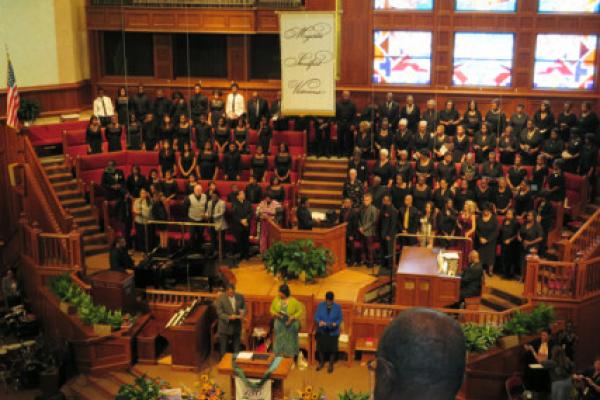WASHINGTON — Fifty years to the day after Martin Luther King, Jr., knocked on the nation’s conscience with his dream, religious leaders gathered in a historic church to remind the nation that he was fueled by faith.
Later, in the shadow of the Lincoln Memorial where King thundered about America’s unmet promises, King’s children joined the likes of President Barack Obama and Oprah Winfrey to rekindle what Obama called a “coalition of conscience.”
At Shiloh Baptist Church, where King preached three years before his 1963 “I Have A Dream” speech, Christian, Jewish, Muslim, and Sikh clergy summoned King’s prophetic spirit to help reignite the religious fires of the civil rights movement.
King’s daughter, the Rev. Bernice A. King, said at the service that her father was a freedom fighter and a civil rights leader, but his essence was something else.
“He was a pastor,” said King, who was 5 when her father electrified the nation in front of the Lincoln Memorial. “He was a prophet. He was a faith leader.”
“We can never forget as we celebrate, as we remember ... that it was that faith and the spirit of God itself that fueled, that infused the movement that led to great change and transformation in the 50s and 60s.”
The Rev. Raphael Warnock, senior pastor of Martin Luther King’s own spiritual home, Atlanta’s Ebenezer Baptist Church, said they had come together to celebrate a servant of God, “whose ministry stretched far beyond the four walls of the church, and whose parish was America and the world itself.”
Other clergy recalled with pride how members of their own faiths joined with King 50 years ago to nonviolently challenge racism and demand equal opportunity and jobs.
Rabbi Julie Schonfeld, executive vice president of the Rabbinical Assembly, read from a letter written to King by Rabbi Abraham Joshua Heschel, who walked shoulder-to-shoulder with him during the freedom march from Selma to Montgomery, Ala. in 1965.
“Even without words, our march was worship,” Heschel wrote. “I felt like my legs were praying.”
Schonfeld said that in the years after the Holocaust, King gave Jews in America a spiritual rebirth, a reason to believe that “God had not forsaken all mankind.”
Born in Sudan, Imam Mohamed Magid, president of the Islamic Society of North America, said King’s legacy made it possible for 28 faith communities came to his mosque after 9/11 to pray alongside his congregation.
King taught that “hate cannot drive out hate,” Magid said. “Only love can do that.”
After the morning prayer service, throngs gathered at the site of King’s speech to mark decades of progress but warn that justice remains elusive for some.
“We’re not here to claim any victory. We’re here to say that the struggle continues,” said Andrew Young, a King aide who went on to become mayor of Atlanta, U.N. ambassador and president of the National Council of Churches. “Pray on and stay on and fight on.”
Added King’s eldest son, Martin Luther King, III: “No one ever told any of us that our road would be easy. I know that our God, our God, our God would not bring all of us this far to leave us.”
The Rev. Joseph Lowery, one of the last living icons of the civil rights movement, spoke from a wheelchair close to the imposing statue of Abraham Lincoln and challenged the crowd to battle modern-day efforts to deny rights and restrict freedom.
“We come here to Washington to say we ain’t going back,” said Lowery. “We’ve come too far, marched too long, prayed too hard … bled too profusely and died too young to let anybody turn back the clock on our journey to justice.”
Lauren Markoe and Adelle M. Banks write for Religion News Service. Via RNS.
Got something to say about what you're reading? We value your feedback!
